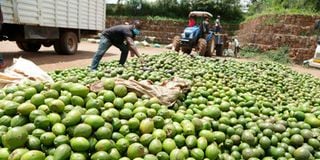Breaking News: Ruto postpones school reopening indefinitely due to flooding
Kenya raises standards for its avocado exports

A man sorts avocados at Keumbu market in Kisii on August 19, 2021.
Kenyan horticulture regulator has raised the threshold for the minimum solid content allowed in avocado for export, citing stringent requirements in key global markets.
Horticulture Crops Directorate said the minimum dry matter for Fuerte and Hass varieties of the fruit has been reviewed upwards to 24 percent from the current 20 percent and 21 percent respectively.
“This is meant to improve fruit quality aspects in line with global market requirements, safeguard and enhance Kenya’s competitiveness in the global arena,” Mr Benjamin Tito head of the directorate said.
Dry matter is the solid content of the fruit. As an avocado grows, its dry matter content also increases and this can be used to gauge its maturity. Development of the fruit can also be tracked by the increase in the oil content.
Presently, exporters of the Hass variety to the key European market must meet a minimum dry content matter of 21 percent while fuerte must be at least 20 percent in dry content before they can be harvested to meet customer tastes.
There is also a minimum dry matter threshold of 23 percent for avocados that are required to ripen upon arrival at their import destinations.
Kenya has lately tightened harvest and export conditions for avocado following a global shortage that triggered unethical practices such as immature harvesting of the crop by crooks seeking to capitalise on strong demand for the fruit.
The country’s avocado export window was only re-opened in March after a four-month ban. Export of the popular Fuerte and Hass varieties resumed on March 4 and March 18 respectively.
Exports of the pair was stopped about four months ago to curb harvest of immature crop following previous rampant cases of traders picking young crops to capitalise on high prices of the commodity on the international market.
Kenya’s avocado market in the Middle East was also hit in 2018 following export of immature fruits to that continent.
The decline resulted from immature avocados that were being exported to Dubai by unscrupulous businessmen following the high demand for fruit in the world market.
Top world avocado producers, Mexico and Peru are currently off the main season—creating a shortage of the fruit.
Avocado has been a major contributor to the earnings in the horticulture sector, raking in nearly half of the total returns from fruits.
During the export restriction, earnings from fruits declined marginally in 2021 to Sh18.3 billion from Sh18.4 billion a year earlier despite an increase in volumes from 105 million kilos to 117 million last year.





